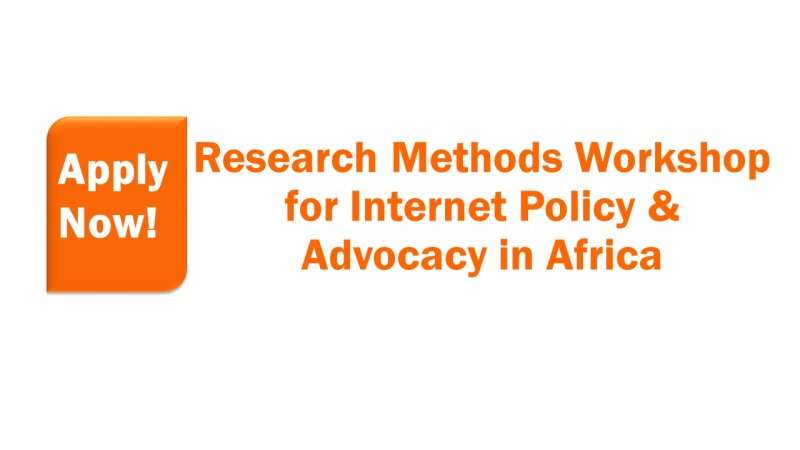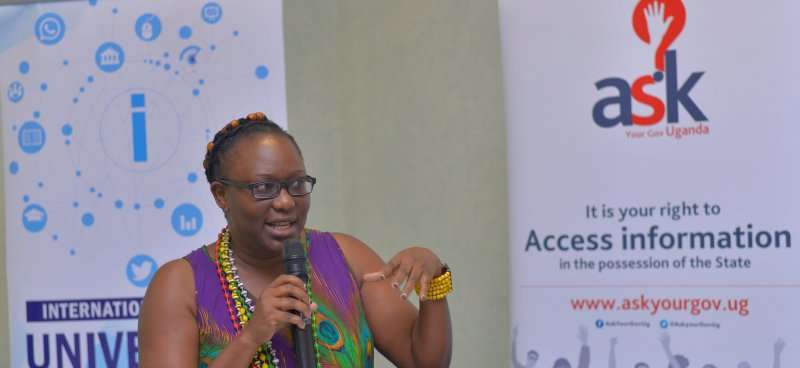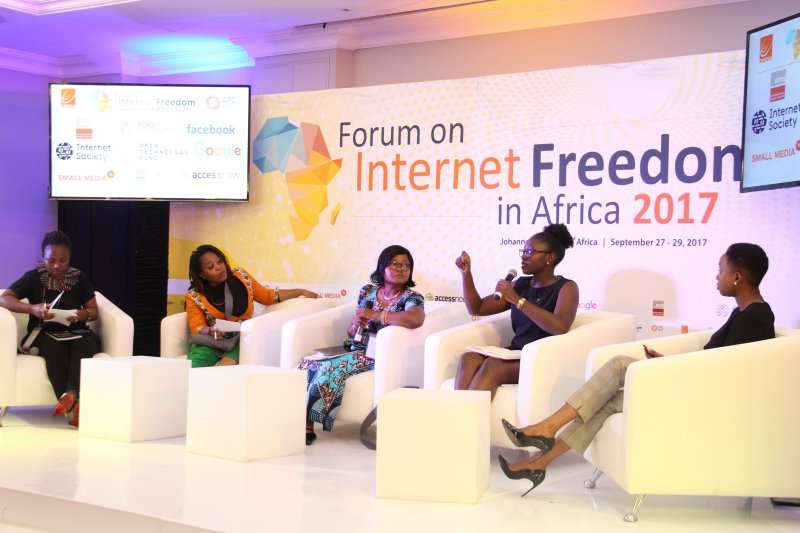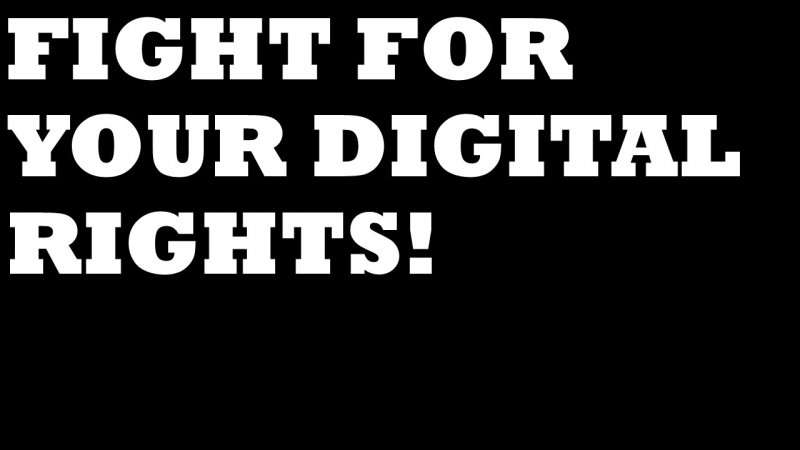Call for Applications |
The Annenberg School for Communication’s Internet Policy Observatory, the Collaboration on
International ICT Policy in East and Southern Africa (CIPESA), Research ICT Africa, Kenya ICT Action Network (KICTANet), Unwanted Witness, Paradigm Initiative, and
Young ICT Advocates seek applications from young scholars, activists, lawyers, and technologists working across Africa for an intensive practicum on using research for digital rights advocacy.
The workshop seeks to provide a venue for stakeholders in the region to build collaborative possibilities across sectors, expand research capacity within practitioner and digital rights advocacy communities, and to provide the skills and know-how to more strategically use research and data to advance advocacy efforts. Sessions will cover both qualitative and quantitative methods and will provide the space for hands-on activities and the development of individual and group research interests. In this way, the workshop seeks to provide opportunities to connect scholarly expertise with policymakers and advocates and improve working synergies between emerging African networks of civil society organizations, academic centers and think-tanks.
Sessions will include workshops on stakeholder analysis, conducting interviews, researching laws and regulations, social network analysis, network measurement, survey methods, data visualization, and strategic communication for policy impact.
We encourage individuals from Africa in the academic (early career), NGO, technology, and public policy sectors to apply. Prospective applicants should have a particular area of interest related to internet governance and policymaking, censorship, surveillance, internet access, political engagement online, protection of human rights online, and/or corporate governance in the ICT sector. Applicants will be asked to bring a specific research question to the program to be developed and operationalized through trainings, group projects, and one-on-one mentorship with top researchers and experts from around the world. Several partial and full scholarships will be made for the most competitive applicants to participate.
The course will be conducted in English and applicants should have high proficiency in English in order to interact with experts, lecturers and other participants who will come from diverse backgrounds. Please also note that we require all participants to have a laptop to use for the duration of the program.
Application Deadline: November 10, 2017
Workshop Dates: Feb 26 – Mar 3, 2018 | Location: Kampala, Uganda
To apply for the program, please fill this form.
For questions, please email Laura at [email protected].
Access to Public Information in Uganda: Rhetoric or Reality?
By Loyce Kyogabirwe |
Norah Owaraga, a Ugandan researcher, recently narrated her experience on accessing government-held information in the country. She recounted a trip to Tororo district in eastern Uganda where she sought information on Tuberculosis prevalence in prisons. “I was told to go back to the prisons headquarters in Kampala (the capital) to get authorisation yet I had already received clearance from Uganda National Council for Science and Technology (UNCST) and the President’s Office to access government information. Why did I have to travel back to Kampala when I had all the clearance?” asked Owaraga.
Her question was directed at Frank Baine, the spokesperson of Uganda Prisons, during a dialogue held in Kampala to commemorate the International Day for Universal Access to Information, which falls on September 28.
In his response, Baine quoted section 4.8.1(i) of the Code of Conduct and Ethics for Uganda Public Service, 2006 and the Official Secrets Act 1964, stating that public officials are custodians of information that comes into their possession during the course of duty. “Without due permission from an authorising officer, such information cannot be communicated,” explained Baine. In Owaraga’s case, he said the authorising officer was not within the UNCST or the President’s office. Rather, it was the head of Uganda Prisons who had the mandate to authorise the release of the information.
Owaraga’s experience mirrors the challenges faced by Ugandan citizens in realising the right to access information. The right of access to information is enshrined in article 41 of the Constitution of the Republic of Uganda, 1995 which provides that, “Every citizen has a right of access to information in the possession of the state or any other organ of the state except where the release of the information is likely to interfere with the security of the state or the right to the privacy of any other person”. Uganda was among the first African countries to enact a right to information law, the Access to Information Act (ATIA), 2005 and later the Access to Information Regulations, 2011.
The ATIA is aimed at promoting transparency and accountability in all organs of the state by providing the public with timely, accessible and accurate information. Baine’s response instead highlights that a culture of secrecy still persists, with limited proactive release of information by public agencies and denial of citizens’ requests for information.
Other challenges that were raised during the dialogue include the high costs of accessing information, lack of knowledge of the provisions of ATIA among citizens and public officials, and the tedious procedures of requesting for information – all of which impact on the level of citizens’ information requests.
Despite the challenges, the government has taken some steps to promote access to public information. Speaking at the dialogue, Moses Watasa, Commissioner of Information Dissemination at the Ministry of ICT and National Guidance, explained that the Ministry is working to sensitise all government ministries, departments and agencies (MDAs) on ATIA as well as strengthening communication departments within MDAs and local governments with the aim of improving information gathering and dissemination.
Furthermore, the ministry has developed a centralised government information web portal (www.gov.go.ug), which functions as a gateway to all other government websites. The portal is reinforced by the ministry’s requirement for all MDAs to have a communications officer, functional website, a presence on social media and email addresses for officials to ensure public accessibility.
Watasa acknowledged that there has been a culture of secrecy among public officials further compounded by internal bureaucracies. He stated that the government was working to review archaic guidelines that restrict responsiveness or proactive disclosure by public officers.
Meanwhile, according to Watasa the government is also due to launch Open Government Sessions aimed at bridging the information gap between citizens and duty bearers. The sessions, which will be hosted monthly, will involve different MDAs interfacing with the public on functions, ongoing activities, budget allocations and expenditure and feedback. It is expected that the sessions will be broadcast live on TV and leverage social media platforms to allow remote participation.
However, it remains unclear when the archaic laws and guidelines will be reviewed and implemented to ease citizens’ access of public information. It is only through improved access to information that there can be increased social accountability and government transparency towards improved service delivery and greater citizen participation in governance and democratic processes.
The dialogue on access to information in Uganda was organised by the Collaboration on International ICT Policy for East and Southern Africa (CIPESA) in partnership with the Ministry of ICT and National Guidance in the context of the ICT4Democracy in East Africa initiative’s objective to engage stakeholders on supportive policies and practices for human rights and democratic governance in East Africa. It brought together 50 participants including public officials, policy makers, civil society, media, and scholars to reflect on the role of information in improving service delivery and accountability in Uganda.
Using FIFAfrica17 Conversations To Drive Change
By Martha Chilongoshi |
The Africa I want is one that embraces diversity, promotes freedom of expression, values the right to information and prioritizes the elimination of all forms of discrimination on the basis of gender.
For my ideal Africa to be realized, actions, initiatives and conversations that challenge the status quo and disrupt structural systems which hinder development are very vital and this is what the Forum on Internet Freedom represents for me, an opportunity to meet like-minded people and share ideas as well as experiences on how to advance our societies for the better.
A communication for development professional like me finds great value in the Forum on Internet Freedom gatherings because it presents diverse opportunities for me to learn about the social, economic and political factors affecting internet access and usage in other countries in Africa and how I can apply lessons from there to address and solve prevailing issues in my own country – Zambia.
More importantly, the forum has deepened my knowledge on the role of the internet in the development agenda in that, I have been afforded the opportunity to meet my online community in an offline setting and build a support structure that offers solutions and coping strategies to challenges of internet shutdowns, restrictions on freedom of expression, women’s safety online, privacy and security among other things.
As a gender equality & human rights activist, I particularly enjoyed the session on “Finding equality in an age of discrimination online” with panelists, Emilar Gandhi (Facebook), Daniel Kigonya, (iFreedom Uganda), Caroline Tagny (CAL) and Fungai Machirori (APC). This was an important conversation for me because personally, I have committed to use my skills as a Journalist to create awareness and give prominence to issues that affect women and girls using social media and blogging platforms and in my experience, online spaces have not been spared from the patriarchal structures and attitudes that exist offline
Patriarchy has been defined in the Merriam Webster dictionary as;
– a social organization marked by the supremacy of the father in the clan of the family
– the legal dependence of wives and children, and the reckoning of descent and inheritance in the male line
– control by men of a disproportionately large share of power
With this in mind, it is not surprising that online spaces are being used to perpetuate the very inequalities that exist offline and policing how women and girls express themselves online, how they report violations and how they narrate their experiences. This is why the conversation on “Women’s safety online” by panellists, Francoise Mukuku (Si Jeunesse Savait DR Congo), Irene Kiwia (Tanzania Women of Achievement), Emilar Ghandi (Facebook) and Twasiima Patricia (Chapter Four Uganda) was also very key because it addressed the need to ensure women and girls are protected online and users of the Internet adhere to the set community standards and ideals that deter them from perpetuating abuse and discrimination.
I must add that apart from the panel discussions, I really enjoyed the personal conversations I had during tea and lunch breaks, one of my favourite discussions on the sidelines of the Forum was a conversation about feminism and gender equality with Tricia from Uganda and Tracey from Kenya. As the image below will show, we were so invested in the conversation and it was a brilliant, rich and empowering exchange of young women daring to stand up against structures and environments that perpetuate discrimination using online spaces.
 Another key take away from these two sessions was the need to empower women and girls with information about their rights through access to the internet so they can recognise when those rights are being threatened or violated by another person. Often, women and girls are socialised and conditioned to think that they cannot make decisions without the approval of their male relations because from time in memorial, the power lies with men and women are constantly subjected to finding ways of not upsetting this hold on power and in effect remaining silent in the face of violence.
Another key take away from these two sessions was the need to empower women and girls with information about their rights through access to the internet so they can recognise when those rights are being threatened or violated by another person. Often, women and girls are socialised and conditioned to think that they cannot make decisions without the approval of their male relations because from time in memorial, the power lies with men and women are constantly subjected to finding ways of not upsetting this hold on power and in effect remaining silent in the face of violence.
There are many progressive developments that online spaces have provided to ordinary people in terms of dealing with equality, freedom of expression and access to information. More people are now able to voice out on issues that affect them in real time and create a critical mass through social movements that have proved to be a force in challenging the powers that be. This has easily been evidenced by internet shutdowns by governments in Zimbabwe, Cameroon, Togo and Gambia among other countries.
This brings me to another conversation I found most intriguing at the forum themed “Privacy & Freedom of Expression” which was wonderfully moderated by Gbenga Sesan of Paradigm Initiative and featured panellists from state institutions namely James Mutandwa Madya (Ministry of ICT Postal and Courier Services Zimbabwe), Micheal Ilishebo (Zambia Police Service), Marian Shinn (MP, Parliament of South Africa) and Fortune Mgwili-Sibanda (Google).
For the last two years, my line of work has involved working on projects that are centred on democracy, good governance and civic participation especially during electoral processes and this particular conversation was key in understanding how state institutions view the internet and its power to connect people for social change. The conversation between the panellists and audience brought one thing to light, many African governments are threatened by the power that the internet gives to ordinary citizens and as a result, opt to shut it down in order to repress social movements that mobilise people towards an issue.
This can be proved by revisiting how the Zimbabwean government dealt with Evan Mawarire, a pastor whose social media movement dubbed #ThisFlag inspired thousands of Zimbabweans online and offline to demand for better conditions of living from their government. He had to flee his country because his family was no longer safe and when he eventually returned, he was immediately arrested and charged with “attempting to overthrow a constitutionally elected government”.
Another prominent case was that of Cameroon where the Internet was shut down for 3 months in the English speaking region of the country by the government. The shutdown caused hundreds of citizens to mobilise and find alternative means of accessing the internet and creating the hashtag #BringBackOurInternet to let the world know of the discrimination and suppression that was happening in Cameroon. Among the prominent Cameroonian voices that demanded for the restoration of the internet was the Forum’s keynote speaker, Rebecca Enonchong, Founder and CEO of Apps Tech who shared her experience on the impact of the internet shutdown on the rights and freedoms of Cameroonians and to a great extent, its impact on the economy.
If I have to sum up my experience at the forum on internet freedom 2017, I will say that it has given me a fresh and dynamic perspective of the internet, it has broadened my knowledge on the many ways I can use the internet as a tool and an enabler for my human rights activism and encourage civic participation in my community. It has also allowed me to see the economic impact that an internet shutdown can have on a country and for me, this is a great angle from which to advocate for an open, neutral and free internet. I can’t wait for next year’s conversation!

Originally published on the Revolt For Her website
Internet shutdowns take centre stage at #InternetFreedomAfrica forum
By Shitemi Khamadi |
When figures are put forth, bringing the arguments of something to the table, the conversation changes. One starts to look at the loss accrued from their actions or inactions and make an informed decision. In the same vein, when people come together to fight for a course, a just course, the likelihood of succeeding is higher.
This was the case at the Forum on Internet Freedom in Africa 2017 where the Collaboration on International ICT Policy for East and Southern Africa (CIPESA) launched a report affirming that over a period of 236 days, internet disruptions in 10 African countries led to loss of US$237 million. That is a colossal amount, equivalent to some budgets of key infrastructure projects on the continent.
Meanwhile, the 2017 State of the Internet Freedom in Africa Report themed; Intermediaries’ Role in Advancing Freedom: Challenges and Prospect also highlighted the critical role of telecommunications companies in government-initiated shutdowns and censorship.
 In a panel on privacy and freedom of expression, a representative from Zimbabwe’s Ministry of ICT, Postal and Courier Services asserted that the country will not shutdown the internet. Neither will they disrupt social media. The official stated that the negative effects of shutdowns initiated in other countries were clear and limiting access to the internet stifles expression, causes more harm than good. For an otherwise autocratic regime, this is telling of its appreciation of the impact technology has on the lives of citizens; social-economic and political.
In a panel on privacy and freedom of expression, a representative from Zimbabwe’s Ministry of ICT, Postal and Courier Services asserted that the country will not shutdown the internet. Neither will they disrupt social media. The official stated that the negative effects of shutdowns initiated in other countries were clear and limiting access to the internet stifles expression, causes more harm than good. For an otherwise autocratic regime, this is telling of its appreciation of the impact technology has on the lives of citizens; social-economic and political.
Equally important to the debate about quantifying the cost and impact of shutdowns was the session titled ‘Unmasking the real impact of internet shutdowns in Africa’. The panellists included Fiona Asonga from Tespok, a Kenyan organization that brings together telecom operators but also software & hardware developers & ICT hubs.
Asonga shared on policy advocacy efforts to push back against the Cameroonian government’s shut down of the internet in the English speaking regions for 93 days. She emphasised that continuous engagement was key to ensuring progressive actions from such governments.
The #KeepItOn session was great for advocacy enthusiasts. Here, coalition experiences of how to fight back against shutdowns were shared including joint condemnation letters to authorities and social media campaigns. Perhaps the most piercing is the collecting and dissemination of individual impact stories on the negative effects of shutdowns to lives. Such, go beyond abstract thoughts and conversations to real life scenarios.
Privacy was another recurring theme at the Forum with discussions highlighting the lack of data protection policies in many African countries, which had led to a growing trend of data breaches. For instance in Kenya where data protection is not well regulated, concerns arise as to whether intermediaries care an inch about the tons of private data they have on people. Kenyans receive unsolicited SMSs from politicians and businesses about their products. They can easily blame telcos for sharing their data but between the telco and themselves, lay tens of places like buildings and mobile money outlets where details are disclosed and any unscrupulous individual can mine for personal gain.
What was lacking from these conversations were insights on how African countries can fast track implementation of effective data protection laws. Going by the example of the Access to Information Act in Kenya that took the Private Members’ Bill approach after government stalled, could such an approach be explored towards citizens’ realisation of the right to privacy?
Overall, sessions at the Forums were quite timely, and so were the practical digital security clinics run by Access Now and DefendDefenders to ensure activists are equipped with the necessary skills and knowledge to work safely and securely.
Here is to a toss The Collaboration on International ICT Policy for East and Southern Africa (CIPESA) and the Association for Progressive Communications for a good job done.
The article was originally published on the iFreeKe website
Strategic Litigation as an Answer to Preventing Internet Shutdowns?
By Kuda Hove |
Zimbabwean lawyer and activist Kuda Hove reflects on a workshop he attended on strategic digital rights litigation hosted by the Berkman Klein Center for Internet & Society at Harvard University and Media Legal Defence Initiative as well as on various discussions from the recently concluded Forum on Internet Freedom in Africa.
The Forum on Internet Freedom in Africa 2017 (FIFAfrica17) was a great platform to learn more about the issues plaguing the African Internet space. The event was also a platform to interact with some of Africa’s sharpest Internet activists and explore opportunities for collaborative interventions for advancing internet freedom on the continent.
From the Strategic Digital Rights Litigation training workshop, I learned how litigation can serve as a tool to promote and protect online rights in various African jurisdictions. It was also in this workshop that I learnt about the role of African Regional Courts in internet and information rights related matters which are referred to them by African nationals, as evinced by the case of Lohé Issa Konaté v. The Republic of Burkina Faso in which the right to freedom of expression and freedom of the press were upheld.
I come from Zimbabwe where referral of cases to regional courts such as the African Court of Human and Peoples’ Rights is rare. In the past, Zimbabweans have successfully referred a land matter to the Southern Africa Development Community (SADC) Tribunal. However, the government of Zimbabwe ignored the SADC Tribunal ruling and pushed for changes to be made to the SADC Tribunal. As a result, it is no longer possible for private SADC citizens to directly report State sponsored human rights violations to the SADC Tribunal. It was therefore, interesting to interact with session facilitators and participants who were conversant in the procedure involved in approaching other African regional and supranational courts.
 The various discussions on Internet shutdowns in Africa were of interest to me especially when the Forum’s keynote speaker Rebecca Enonchong, described her experience during Cameroon’s 93 day internet shutdown which took place between January and April 2017. She said the deliberate shutdown of the Internet in English speaking parts of Cameroon led to a rise in “Internet refugees.” That is, individuals who travelled from parts of Cameroon without the Internet to other parts of the country where Internet was available for the purpose of accessing social media messages, emails and other Internet based communications.
The various discussions on Internet shutdowns in Africa were of interest to me especially when the Forum’s keynote speaker Rebecca Enonchong, described her experience during Cameroon’s 93 day internet shutdown which took place between January and April 2017. She said the deliberate shutdown of the Internet in English speaking parts of Cameroon led to a rise in “Internet refugees.” That is, individuals who travelled from parts of Cameroon without the Internet to other parts of the country where Internet was available for the purpose of accessing social media messages, emails and other Internet based communications.
The concept of Internet refugees reminded me of the experience of some of the rural populations in Zimbabwe. We might not have experienced internet shutdowns, but access to the Internet in areas outside of main cities and towns remains problematic, largely due to lack of infrastructure. Access to the Internet is still directly affected by factors such as access to electricity, sparsely populated cellphone towers, and lack of any substantial fixed line networks in rural areas. These infrastructure inadequacies contribute to the growth in the digital divide between urban and rural populations. Residents in rural areas are left with no choice, but to travel from their homes to the nearest clinic, growth point, or other business centre for the sole purpose of accessing mobile networks which allow them to communicate over the Internet. Given that rural women are seized with domestic roles, it is usually men who are able to travel to these areas with mobile network access, thus contributing to a gender divide when it comes to the use of ICT based communications in rural areas.
The panel discussion on the impact of Internet shutdowns raised a number of thought-provoking points and questions. For example, how do activists convince governments not to shut down the internet in their respective countries? Would an economic argument based on the negative economic impact Internet shutdowns have on national economies be effective? Or is it more effective to argue against Internet shutdowns from a human rights perspective which highlights the fact that the United Nations has recognised access to the Internet as a human right that must be protected? Despite both these arguments, the trend of internet shutdowns initiated by African governments continues to grow, which indicates that they do not care about economic loss resulting from Internet shutdowns, and the same governments have also shown a culture of impunity in respect for human rights.
 I walked away from #FIFAfrica17 pondering how successful strategic litigation against an African government which has shut down the internet might be. In my mind, this would be an attention-grabbing test case which just might be a solution and deterrent to errant African governments. Such a case would be argued before a court such as the African Court of Human and Peoples Rights. The legal basis for this challenge would be that the government in question has violated its citizens’ fundamental rights such as the right to access to information, right to freedom of expression, and the right to freedom of assembly. These rights all enjoy protection under the African Charter on Human and People’s Rights and their violation is a violation of this continental instrument. Furthermore, private sector players can even act as amici curiae and provide proof of the economic prejudice they have suffered as a direct result of being cut off from the Internet. Time will tell whether such strategic litigation will prove effective in the fight against Internet shutdowns in Africa.
I walked away from #FIFAfrica17 pondering how successful strategic litigation against an African government which has shut down the internet might be. In my mind, this would be an attention-grabbing test case which just might be a solution and deterrent to errant African governments. Such a case would be argued before a court such as the African Court of Human and Peoples Rights. The legal basis for this challenge would be that the government in question has violated its citizens’ fundamental rights such as the right to access to information, right to freedom of expression, and the right to freedom of assembly. These rights all enjoy protection under the African Charter on Human and People’s Rights and their violation is a violation of this continental instrument. Furthermore, private sector players can even act as amici curiae and provide proof of the economic prejudice they have suffered as a direct result of being cut off from the Internet. Time will tell whether such strategic litigation will prove effective in the fight against Internet shutdowns in Africa.





